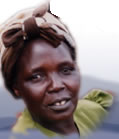THEMES IN THIS
TESTIMONY
Education

Family Life

Gender

Social Change

Spiritual Beliefs

Click on arrows
to find more
testimonies
featuring
these themes
|
|
Sex
|
Female
|
|
|
Age
|
53
|
|
|
Identity
|
Sabaot
|
|
|
Occupation
|
Retired headmistress
|
|
|
Location
|
Kapsokwony
|
|
|
Date
|
18 November 1996
|
|
summary
This is a detailed and revealing discussion, which benefits from the interviewer’s intelligent questions and a narrator who is not afraid to speak frankly. Unlike most of the interviews, this was mostly conducted in English, with occasional Kiswahili. The main topics concern women: their own perceptions and others’ perceptions of them; their roles; and the way their lives have been affected by education and the ethnic clashes. The narrator has evidently considered these issues carefully.
Beatrice is a retired headmistress who has dedicated her life to the promotion of education, particularly for girls: “I encouraged many parents to educate their daughters. I was giving them myself as an example.” She showed a strong commitment to education from an early age, convincing her father to continue sending her to school, against her mother’s wishes: “…father, I will not let you down I promise”, and refusing several marriage proposals so as to continue her education. Not surprisingly, education is her major theme, incorporating both the formal and traditional, as well as its relation to gender, religion, and ethnic divides. “Every community has its own way of preparing their youth to face the challenges of life.” The narrator describes the gendered division of traditional education, and the importance of the grandmother in teaching girls about their roles. “The two traditions - the school and ordinary Sabaot tradition - didn't interfere [with each other] except...after circumcision.” The narrator describes how after circumcision, girls are supposed to be married off, and so this leads to many dropping out of school, but she feels the community’s view on girls’ education has changed over the years: “if you educate a girl, you educate a nation”. Educated girls are seen as more reliable in looking after their children and parents.
The narrator gives us an interesting gendered perspective on the recent clashes. Women had often intermarried between groups and so they felt hurt “on both sides”. “We are hurt as women because we gain nothing…women have no boundaries, we have no tribal boundaries.”
detailed breakdown
|
You will need a password from Panos to view the full
transcript of the interview. To apply for a password, click here.
Once you have a password, click here to go to the beginning
of the transcript. You can also click on any section of the
breakdown of content below and go straight to the
corresponding part of the transcript.
|
| Section 1 |
Describes those who left the countryside for the town because of the ‘ethnic’ clashes. “…women and the children – those were the most adversely affected.” Children became thieves because of hunger; women were ignorant of urban cooking methods and so wasted charcoal.
|
| Section 2 |
Many couples separated because of the difficult conditions in the towns. “The husband or husbands, most of them left their families and went to live elsewhere on their own.”
|
| Section 3-4 |
Belief that educated women are an asset and that they prepare their children for school better (feed and clothe them)- how she herself dealt diplomatically with mothers who did not do this.
|
| Section 4-5 |
Traditional teachings given to boys and girls. Customs and beliefs about sex and courtship - role of grandmother in educating the girl.
|
| Section 6 |
Bad clans to intermarry with: “Some clans are believed to have bad omens.”
The clash between formal teaching + traditional teaching over circumcision.
|
| Section 6-7 |
Her educational history. Arrival of the gramophone and guitar meant people partied at night and were too tired to go to school next day.
|
| Section 8 |
Inspired to continue her education after she saw some educated African women mixing freely with Europeans, and after the District Commissioner visited their school and told them that one-day they would rule their own country if they were educated.
|
| Section 9 |
How she convinced her father to let her continue going to school, despite her mother wanting the contrary.
|
| Section 10-11 |
Her training and employment history.
|
| Section 11-12 |
Reasons for girls dropping out of the higher levels of education: pregnancy, circumcision, and/or marriage.
How she refused many marriage proposals to continue her education.
Discouraged by her mother from entering a polygamous home.
|
| Section 12-13 |
Describes how she was received when she returned home after completing her teacher training. Belief that an educated girl “will always help you when you are in problems, but a boy will not”. Her role in encouraging the growth of girls’ education.
|
| Section 13-15 |
The Church’s role in education in the region. Arrival of African missionary teachers of different ethnic tribes – good relationship between the Sabaot and them.
|
| Section 16 |
Conflicts between the various churches and traditional customs and beliefs; Catholic Church is more lenient and therefore has a large following.
|
| Section 16-17 |
Kapsokwony is home to the only girls’ school in the area. Says, “…working daughters help their parents more than the sons who are working.” because of their traditional upbringing.
|
| Section 18 |
How girls would be checked to see if they were virgins. Consequences for those who were discovered to have lost their virginity. |
|


